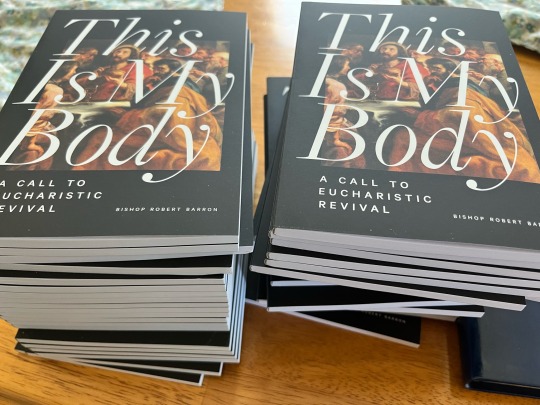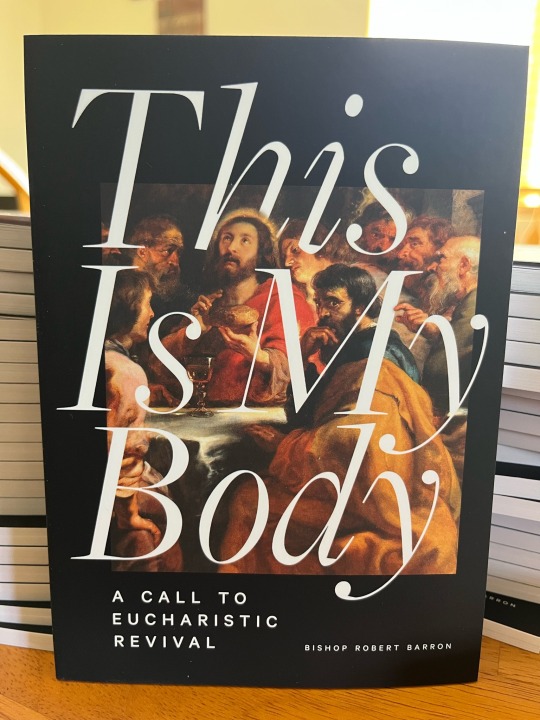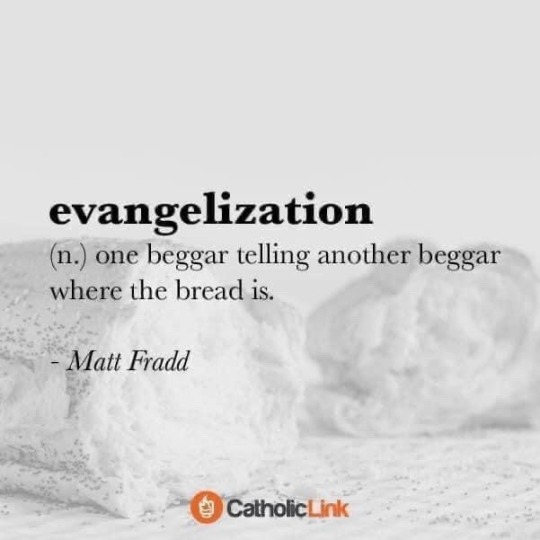#evangelization
Text
[The miracle of the loaves & fishes in John 6 is a famous one, yet] there were certain people there without whom the miracle would not have been possible. First, there was Andrew. There is a contrast between Andrew and Philip. Philip was the man who said: "The situation is hopeless; nothing can be done." Andrew was the man who said: "I'll see what I can do; and I'll trust Jesus to do the rest." It was Andrew who brought that lad to Jesus, and by bringing him, made the miracle possible. No one ever knows what will come out of it when we bring someone to Jesus... Andrew did not know what he was doing when he brought that lad to Jesus that day, but he was providing material for a miracle. We never know what possibilities we are releasing when we bring someone to Jesus.
Secondly, there was the boy. He had not much to offer, but in what he had, Jesus found the materials of a miracle. There would have been one great deed fewer in history if that boy had withheld his loaves and fishes. [By this we learn that] Jesus needs what we can bring Him. It may not be much but He needs it. It may well be that the world is denied miracle after miracle and triumph after triumph because we will not bring to Jesus what we have and what we are. If we would lay ourselves on the altar of His service, there is no saying what He could do with us and through us. We may be sorry and embarrassed that we have not more to bring-- and rightly so; but that is no reason for failing to bring what we have. Little is always much in the hands of Christ.
William Barclay
#william barclay#Saint andrew#The miracle of the loaves & fishes#John 6#jesus christ#Miracles#evangelization#I am tragically guilty of this#Trust in god#Give your all to God#Nothing is impossible with God#Cooperation with God#A humbling truth#reflect on this
16 notes
·
View notes
Text
Person: Are you a believer?
Me: *standing next to my locker at work that I have opened covered with magnets of Bible verses while I’m wearing my St. Thérèse of Lisieux shirt* yes :)
14 notes
·
View notes
Text
Friday of the 27th Week in Ordinary Time | 13 October 2023
'Wag po nating buhusan ng malamig na tubig ng ating inggit ang init ng pag-ibig ng isang tao para sa iba.
Kung hindi na po ninyo matatanong, 10 buwan pa lang po akong pari at sa kasalukuyan po ay naka-assign po ako sa Our Lady of Guadalupe Minor Seminary. Dito po nag-aaral ang isa sa mga seminarista po ng inyong parokya, si Yashua Caladiao.
Noong inoohan ko po last year si Cardinal Advincula na maging formator o tagahubog ng mga batang ito para maging future priests natin, ang akala ko po ang trabaho ko lamang ay magbantay sa kanila - turuan silang magdasal, turuan ng mabuting asal, turuan paano mapalapit sa Diyos, paano magsalita sa harap ng maraming tao... at inisip ko nung una, madali lang pala.
Pero kinalaunan, minsan napadaan po ako sa aming accounting office. Nakita ko po yung aming treasurer na pari, nagkakamot ng ulo, stressed na stressed. Sabi ko, "Father, anung problema po?"
Sabi niya, "Ang dami sa mga seminarista natin, hindi pa nakakabayad ng kanila monthly board and lodging." Eh magkano na po ba ang board and lodging ng isang seminarista ngayon - Php. 7,000 pesos multiply by 10 months = Php. 70,000 plus Php. 18,000 na miscellaneous fee - Php. 88,000. Almost isang daang libong piso kada taon.
Eh hindi naman po lahat sa mga seminarista namin ay galing sa mga naka-aangat na pamilya - ang iba po, ang parents nila ay fishball vendor, ang iba naman po ay midwife. Saan po sila kukuha ng 100,000.
Ang daming may utang naming seminarista. Kaya sabi ko, akala ko, magbabantay lang ako ng mga bata, yun pala, kami rin hahanap ng pambayad sa kanilang mga gastusin.
Isang beses, nagmisa po ako jan sa Makati - may lumapit po sa akin, "Father, I am willing to help you and your seminarians po! I will give you Php. 50,000 per month just to pay for the utang of your seminarians. But please - NEVER MENTION MY NAME AS THE DONOR! Even in your intentions sa Mass do not put my name.
And I asked, "Why?"
"Kasi Father, sa society natin ngayon - may magawang mali na hindi sadya, ang daming sasabihin ng ibang tao. 'Pag gumawa ka rin ng tama o mabuti - MAS MARAMING MASASABI ANG IBANG TAO."
At aminin po natin, minsan ganito rin po tayo gumalaw - kapag ibang tao ang nakita nating gumagawa ng mabuti, imbis na tayo ay matuwa, imbis na tayo ay magpasalamat, nilalagyan po natin ng ibang kulay ang kanilang malasakit.
"Nanlibre yan kasi gusto niya lang manalo sa susunod na election natin ng officers sa MBG!"
"Ayan nanaman siya, nagpakitang gilas nanaman siya, maghapon na nag-serve sa Parish, palibhasa, sipsip siya kay Kura!"
Katulad po sa ating ebanghelyo, narinig natin na gusto lang naman ng Panginoong Hesus na itaboy ang masasamang espiritu na sumapi sa mga tao. Imbis na siya'y pasalamatan, inakusahan pa na humihingi ng tulong sa demonyo (Beelzebul) rin para itabay ang kapwa nito demonyo. Nagmagandang loob na nga, pinagdudahan pa.
Kaya napapatanong po ako, "Bakit nga ba natin sinisiraan yung mga taong mas mabait, mas mabuti, mas masipag, at mas generous kaysa sa atin?"
Hindi po dahil inggit tayo - bagkus, takot tayo - takot na sa kabutihan nila, maiwan tayo, matabunan tayo ng kanilang kabaitan, na makalimutan tayo at 'di tayo mapansin dahil hindi natin kaya maging mabuti katulad nila.
Mga kapatid, "Wag po nating buhusan ng malamig na tubig ng ating inggit ang init ng pag-ibig ng isang tao para sa iba."
Bagkus, dagdagan pa natin ang alab ng kanilang pagmamahal nang sa gayon, mas marami ang mapaso, makaramdam ng pag-ibig ni Hesus sa sanlibutan.
'Wag sana tayong magkumpetensya kung sino ang pinakamapapansin. Bagkus ang paglabanan natin, sino ang mas nagmahal, sino ang mas nag-alay ng buhay, oras, at pagod para sa iba.
Amen.
Year I Readings:
Joel 1: 13-15; 2: 1-2
Luke 11: 15-26
2 notes
·
View notes
Text
Suzume: Preparation for the Gospel
I place this in Mary's hands for her to bring to Jesus
Mark 15:16 “And He said to them, ‘Go into all the world and proclaim the Gospel to the whole creation.’”

First, for those who haven’t seen the movie
a.) Background: Suzume is a 2023 anime movie written and directed by Makoto Shinkai. While it’s his third collaboration with musicians Kazuma Jinnouchi and the Radwimps, if my research is correct, it’s his 7th feature film. In other words, he’s no stranger to movie making. If you haven’t seen it or Shinkai’s other films, I’d say it’s worth a watch here’s the trailer.
b.) SPOILERS, it’s the nature of an analysis, nothing personal. If you don’t want them then go watch the movie.
c.) Premise: Like many of Shinkai’s other movies, Suzume adds a supernatural layer onto your average adolescent story. In this case, it’s an evil spirit called “the worm” that lives under Japan. Whenever it breaks into our world through certain portals – called “doors” – it causes devastating earthquakes. These doors are usually located in abandoned urban areas, e.g. the entrance door for a shutdown school, or the door of a Ferris wheel carriage at an abandoned theme park. Thankfully these gates have been kept shut throughout the centuries by a group of “Closers” who travel throughout the country shutting any gates that may pop up. Par for the course this “closing” takes the form of a spell and then using a physical key to close the door.
Our heroine, Suzume, starts the movie by unknowingly removing one of the two keystones in Japan that help keep the worm from entering our world. Luckily a young Closer, named Souta, has come to town just in time to help her closer the door. The keystone, called Daijin – a spiritual creature in the form of a cat – decides Suzume has given him a vacation, and after turning Souta into a chair and deeming him the new keystone, our feline friend takes his leave.
The rest of the movie is Suzume and Souta traveling across country to close more doors, return Souta to a human state, and get Daijin to return to his post as a keystone.

Freed from Keystone duty, Daijin takes the form of a mischievous kitten.
Second, what’s our take on all this?
Seems pretty pagan, isn’t this a Christian analysis Mr. Blogger?
Of course! And as you’ll all recall Vatican II states that “Whatever good or truth is found amongst them [those who have not yet arrived at an explicit knowledge of God] is looked upon by the Church as a preparation for the Gospel” (Lumen Gentium 16). Neither is this anything new since the phrase preparation evangelica comes down to us from Eusebius writing in the 4th century.
So how does Suzume fit into this?
I suggest the events of Suzume mirror key points of salvation history and thus prepare viewers to understand the Gospel. AND I HAVE MANY EXAMPLES!!

St. Paul preaching at Athens appealed to the mindset of his listeners. There weren’t many converts but that’s more from there own complacency than his own method.
Gospel Parallels
a. Need for a Savior
Halfway through the movie – once Suzume and Souta have gained the assistance of the other keystone guardian, named Sadaijin – we are offered this reason for all the trouble they’re going through: “to set right what has been wronged by human hands.” But what we later find out is that Suzume and Souta aren’t enough by themselves to resolve the keystone issue. They need help, and it needs to be spiritual a.k.a. divine. This is a great way to highlight the fittingness of the incarnation. Man needed to make reparation to God for his original sin, yet man was also incapable of doing precisely that. Thus, God became man so that He might do what we ourselves couldn’t do.
b. Willing self-sacrifice
Especially poignant to the story is Souta realizing he’s become the new keystone and he’ll be deprived of his human life to remained forever a keystone guardian against the worm. While you could view Souta’s sacrifice as a Christ-like one, I don’t think that does justice to the rest of the movie. His sacrifice is noted, especially by his grandfather, but it’s also pointed out that he didn’t actively will to be a keystone. Instead, he merely resigned himself to the role Daijin forced on him. The key here – no pun intended – is that it is only when Suzume proclaims that she’ll willingly offer herself up as a keystone in place of Souta that Daijin changes his mind, helps free Souta, and takes up his role as keystone once again.
This helps viewers understand that Jesus’s Passion wasn’t simply a matter of gritting His teeth and accepting divine punishment from His Father. Rather, Jesus willingly offers Himself out of love. Christ is very explicit about this when He says: “No one takes it from me, but I lay it down of my own accord. I have authority to lay it down, and I have authority to take it up again” (Jn 10:18).

It was in the context of the last supper, at the beginning of His Passion, that Jesus taught his disciples what self-gift, i.e. what true love of God and neighbor is.
c. Nature and Grace
Related to this previous point is how Daijin agrees to help Suzume after she explicitly expresses her willingness to be a keystone in place of Souta. Curiously enough, Daijin doesn’t force Suzume to keep this promise. He doesn’t even mention it. He simply responds by to it by helping her free Souta. The Gospel parallel is this: God doesn’t simply override our wills to accomplish His plan, but desires to work with us.
Another example of this mystery is how at the beginning of the movie both Suzume and Souta think Daijin is running around opening doors for the worm, but in actuality he is guiding them towards the open doors so that they can close them. He’s trying to call them to a greater service but they don’t understand and so think he’s mischievous and malevolent. Does this not call to mind God’s words in Isaiah “For my thoughts are not your thoughts, neither are your ways my ways” (Is 55:8).
d. Acts of Prayer
The formula that Souta recites to close a door references the hills and rivers of the land as gifts from the gods and how people have enjoyed life on this land but now the Closer offers those all back to the gods. Acknowledging that everything in life is a gift is not just a Christian notion, although Paul clearly articulates it one (1 Cor 4:7 What do you have that you did not receive?)But going beyond our life being a gift from God this formula shows how we are called to offer everything back to our Creator not because He’s greedy and demands it but because it helps us – in the movie it literally keeps a destructive spirit out of our life!) What comes to my mind are the beautiful words of one of the Prefaces for Mass: “For, although you have no need of our praise, yet our thanksgiving is itself your gift, since our praises add nothing to your greatness but profit us for salvation, through Christ our Lord.”

Suzume, having learned from Suota how to close a door, activates the key in her hand. If this looks intense, then know that prayer is just the same since by it we fight against the evil spirits who seek the damnation of souls.
e. Healing of memory
Finally if I can offer a more affective example it’s when Suzume meets her younger self and we finally see her internal resolution to all the emotional trauma she’s been dealing with. But I would argue this is done in an incarnational way. It’s not just don’t mentally. The movie doesn’t just have her visit here old house, or find her old notebooks. It doesn’t even pretend she’s talking to herself in her mind. It has her literally going back in time and meeting her younger self (I did say Shinkai was a fan of this stuff).
Nowadays, it’s very common for people to openly talk about their trauma, but often it’s presented as something that can’t be overcome. But this isn’t the Christian approach. Rather, it is precisely by allowing Christ to be King over all parts of our life – as well as all parts of our past – that we are no longer under the terror or fear of what has happened to us. And this isn’t accomplished by just imposing principles anachronistically. Instead, it’s by finding where and how Christ is working in that moment just as little Suzume actually encounters her older self on that cold snowy night.
Final verdict?
To close, I’ll once again recommend Suzume, but more importantly I encourage you to think about any connections you see in our culture that point to our life of faith in Christ. Don’t be afraid of being too geeky by talking about these things with friends – with respect to time and place of course e.g. not in the delivery room. My point is until we act as if our Christian faith has an influence on how we read, watch, and listen to the world around us, then we won’t have the influence on the world that we should as Christians.

One of the reasons why Mary was so effective in converting the Mexican people is that every part of her dress pointed to some native symbolism which informed the Mexican people of her role and status as the mother of God.
#catholic anime#anime analysis#animechristi#catholicism#suzume#evangelization#christian anime#overthinking
2 notes
·
View notes
Text
My Dear Brother in Christ...Look, I love you, but maybe stop and think about what you’re posting, okay? Is it gonna make someone go, “You know what? I was wrong! This blogger is so right!” or at least make them think about it a little more?
No? Than it’s probably not the most helpful thing to post, you still can, but let’s take it a step further...
Is it likely to push someone away from the Church? Is it worth posting just to get a laugh or nod of agreement out of your specific audience with that risk?
* le shrug *
#catholics#Christian#evangelization#catholicism#Christianity#i'm getting real tired of making these call out posts lol#i consider my blog an evangelization blog somewhat especially since anyone can see it#i keep seeing stuff and am like...okay...but is that helping?#i have the same problem with overly aggressive far far far leftists sometimes as they can be so aggressive and make you feel bad#idk how about we have helpful discourse instead being accusatory or dismissive?#just saaaaayyying XD#some of you are just as bad as people on facebook...some probably worse tbh#i'm sorry i feel like i'm sounding aggressive myself and i don't mean to be#and of course i don't think people are responsible for everyone's reactions but still
4 notes
·
View notes
Text
Let us also pray for the Jews: That our God and Lord may illuminate their hearts, that they acknowledge Jesus Christ is the Savior of all men. (Let us pray. Kneel. Rise.) Almighty and eternal God, who want that all men be saved and come to the recognition of the truth, propitiously grant that even as the fulness of the peoples enters Thy Church, all Israel be saved. Through Christ Our Lord. Amen.
The prayer is not for the conversion of the Jews as individuals , but rather for the salvation of “all Israel.” In this prayer, Church declares that “all Israel” consists of the Jews — the Israel of the flesh — as well as the Israel of the spirit, that is, the Church as the People of God. It is consistent with Pope John Paul II’s declaration that the Old Covenant never has been revoked, a position reiterated by Benedict XVI. Catholics therefore pray for “all Israel” to become one and to be saved together.
1 note
·
View note
Text
Quote Oswald J Smith
“If God wills the evangelization of the world and you refuse to support missions, then you are opposed to the will of God.” — Oswald J. Smith
View On WordPress
#evangelization#God&039;s Will#opposing God&039;s will#Oswald J. Smith#quote#refusing#refusing support#supporting missions
0 notes
Text
Behind so much of the language of tolerance, acceptance, and non-judgmentalism in regard to religion is the profound [yet false] conviction that religious truth is unavailable to us and that it finally doesn’t matter what one believes as long as one subscribes to certain ethical principles. Provided one is a decent person, [many claim,] who cares if he or she is a devout Christian, Buddhist, Jew, or Muslim— or nonbeliever? And if that is the case, then why wouldn’t we see the variety of religions as a positive, one more expression of the diversity that so beguiles the contemporary culture? And given this epistemological indifferentism, wouldn’t any attempt at “conversion” be nothing more than arrogant aggression? [The reality is that] the Catholic Church places an enormous emphasis on doctrinal correctness. It most assuredly thinks that religious truth is available to us and that having it (or not having it) matters immensely. It does not hold that “being a nice person” is somehow sufficient, either intellectually or morally; otherwise, it would never have spent centuries hammering out its creedal statements with technical precision. And it most certainly does maintain that evangelization is its central, pivotal, most defining work. St. Paul himself said, “Woe to me if I do not evangelize” (1 Cor. 9:16); and Pope St. Paul VI declared that the Church is nothing but a mission to spread the Gospel. Neither the first-century St. Paul nor the twentieth-century St. Paul thought for a moment that evangelizing is tantamount to imperialism or that religious “diversity” is somehow an end in itself. Rather, both wanted the whole world to be brought under the Lordship of Jesus Christ. This is precisely why every institution, every activity, every program of the Church is dedicated, finally, to announcing Jesus... When any Catholic institution, ministry, or outreach forgets its evangelical purpose, it has lost its soul.
Bishop Robert Barron
#Bishop Robert Barron#evangelization#World youth day#conversion#preach the gospel#jesus christ#Tolerance#religious diversity#epistemology#Religious truth#We need to remember this
13 notes
·
View notes
Text
Ready to evangelize to the family and poor.


#Revival#Eucharistic Revival#evangelization#Catholic#Catholicism#Christianity#Christian#personal#This Is My Body#Bishop Robert Barron
7 notes
·
View notes
Text

#christianity #evangelization #poetry #Jesus
1 note
·
View note
Text
A 524 Word Interview with the Founder of Mission Blueprint
Editor’s Note: Matthew Chicoine interviewed Glen Gauer, founder of Mission Blueprint via phone call on January 19th, 2024. Some of the questions have been rearranged and edited to provide the best reader experience without losing any integrity of the answers given.
What led up to the creation of Mission Blueprint?
It started in 1988. I was searching for the truth. I went to Mass my whole life.…

View On WordPress
#Catholic content#Catholic founder#Catholic interview#Catholic life#Catholic ministry#Evangelization#Glen Gauer#Interview#Marian devotion#Men&039;s Conference#Ministry#Mission Blueprint
0 notes
Text
Wednesday of the 27th Week in Ordinary Time | 11 October 2023
May the misery of others move us to mercy and not to be happy! I believe, no one here is spared from any experiences of pain or difficulties.
Each one of us here has his / her own share of misery. Lahat tayo, in one way or another, may pinagdadaanan. Mayaman o mahirap, bata o matanda - walang takas - lahat mayroong pinagdadaanan.
And to all these baggages, we learned how to adapt by having different coping mechanisms, i.e., ways as to how we will curb / lighten its effects in our lives:
yung iba, bwelo muna - isolate o hiwalay muna sa grupo para ma-solo ang iniisip at nararamdaman;
yung iba naman, konting shot-shot muna para mag-numb ang pakiramdam;
yung iba naman, shopping spree - bili-bili na lang ang stress reliever;
yung iba naman, mag-travel - local or international;
sa mga banal, mag pray or mag pilgrimage;
at yung iba naman, diretso agad sa solusyon para matapos na ang problema.
But there is one coping mechanism, which for me, stands out from all the other mechanisms - yung gusto mong makinig sa lungkot / problema ng iba, hindi para makiramay o makiisa sa pinagdadaanan nila - pero para pagaanin yung kalooban mo at masabing - "Ay, okay pa pala ako - mas mabigat pa pala pinagdadaanan niya! Buti na lang!"
Minsan ganun tayo eh noh... imbis na makiisa sa pagdadalamhati / pagluluksa / paghihirap ng iba - nagiging masaya pa tayo kasi meron pa palang mas kawawa sa atin.
We find comfort in the misery of other people.
Just like Jonah in our first reading - Nung Monday, he was appointed by God to tell the Ninevites to repent lest God destroy their town.
Kahapon Tuesday, he preached about repentance and going back to the Lord which the Ninevites whole-heartedly done!
Today, nagbago na ang mga tao kaya hindi sinira ng Diyos. BUT Jonah is expecting na hindi na sila magbabago, kaya pala sa first reading today - gusto na ni Jonah masira ang bayan nila.
Ibig sabihin, kahit pala na nagpreach siya ng repentance to save the Ninevites, he was half-expecting them not to change so that God may destroy them, so that they will be more miserable than him.
Mga kapatid, hindi po natin ikinasisiya o ikinagagaan ng loob kapag may pinagdadaanan o problema ang iba... hindi po sila coping mechanism.
Rather, our Lord is teaching us that the misery of others should moves us to compassion and mercy - kung malungkot sila, lumungkot din sana tayo bilang pakikiisa.
Diba ganun naman, 'pag nagkwento tayo sa iba, ayaw mo naman na nakangiti sila. Wish natin, sana mag-sad face din po sila. Because in our difficulties, we do not wish good advices, we do not wish wise sayings of other people.
We only need someone who can feel what we feel diba...
Kaya nga po nakakalungkot kapag ang turing natin sa iba, "Hay mas mabuti pa pala ang kalagayan ko, may mas kawawa pa pala sa akin. Buti nga sa kanya!"
So, what is the challenge for us today?
May we give to others what we ask God to give us.
In our Gospel today - the Lord's prayer, a prayer that is very familiar to us - we take for granted the lines, "Forgive us our sins for we ourselves forgive everyone in debt to us."
If we are asking God's mercy and forgiveness for our miseries and wretchedness - may we also give to mercy and forgivness to those asking it from us.
Gusto mo pala kaawan ka ng Diyos sa pinagdadaanan mo, eh bakit masaya ka sa pinagdadaanan ng iba. Ibigay sa iba kung anung hinihingi natin sa Diyos - and soon enough, you will see how God will let you feel his graciousness and love for your life.
Amen.
Year I Readings:
Jonah 4: 1-11
Luke 11: 1-4
2 notes
·
View notes
Text
I cannot express how jarring it was after being raised by a "Porn Addiction Coach" to get into a relationship with a woman and come face to face with the fact that she did actually want me to sexually desire her.
Like, in Evangelical Purity Culture, male desire was basically poison. It was a threat. It was this constant temptation that would destroy everything. And even after leaving, in the sort of queer, feminist spaces i spend most of my time in that wasn't something that pretty much anyone was spending time actively dissuading me from feeling.
But my desire is good. It's not something that I'm being accepted in spite of. It's a positive thing. It's a bonus. Not even just vanilla stuff, all the stuff I'd convinced myself were these weird terrible desires that were shameful to have.
It honestly took me over a decade to fully accept that. To stop dissociating during sex and confront that I was, in fact, being a massive perv and that was fantastic and preferable and that I could accept that into my self-image without shame or self hatred.
But it's important to do. It's important to leave relationships that don't welcome that part of you. To know that your sexuality is valuable and valid and worth owning and celebrating. Because the alternative is just...not being. Either existing as yourself and repressing the part of your identity that is sexual or allowing that sexuality to exist but turning off your self while it does.
#religious trauma#ex christian#deconversion#evangelical purity culture#purity culture#me writing stuff
17K notes
·
View notes
Text
i always roll my eyes a little bit when someone openly looks down on people who are religious/spiritual. ur telling me youve never made a wish before?? never sent a little prayer out into the universe???? get real
#like its worthwhile criticising shit like homeo medicine or evangelism#but ur gonna call someone a brainless moron for doing a tarot reading???? come on man#EDIT OH MY GOD IM AN ATHEIST. I AM AN ATHEIST. IM NOT TRYING TO CONVERT ANYONE ARE YOU SERIOUS
5K notes
·
View notes
Text
just to be completely clear, the amount of military power and political influence Israel has has NOTHING to do with its settlers being Jewish. Israel is a force for American & European interests in the region and they're just doing what America does and allows/encourages its close allies to do.
war crimes aren't considered war crimes when someone America finds useful is doing them. european and american pushback against anyone criticizing Israeli apartheid & genocide is 100% because these crimes are useful to American & European hegemony.
Governments that are deeply antisemitic, like France, aren't suddenly caring about Jewish people. Jewish people, persecuted the world over, don't hold some kind of hegemonic power outside of Israel.
The state of Israel and its attendant brutal treatment of the locals are both incredibly useful to the US, and American hegemony means we're expected to celebrate both.
not bc they're Jewish. this isn't a break in the pattern of western antisemitism and it's not evidence that antisemitism doesn't exist.
it's just like how you could get fired for saying shit against the US war in Afghanistan when i was growing up. it is 100% about US military and political interests (ok slightly western europe too but lbr)
#this widespread support has NOTHING to do w Israelis being Jewish apart from evangelicals wanting to use them as pawns for armageddon#the primary reason this is all being treated like it's ok is cuz it's useful to the usa#i feel like this post is going to bring terrible ppl into my inbox but i'm gonna leave it rebloggable for now#if our (US+EU) governments push back at all it will be because it stops being useful to us#either because Israel isn't doing this as quickly & efficiently as promised and it looks like Palestine might actually do some damage#or if it otherwise becomes too politically costly by causing too much tension between the US & other nationstates#either allies like Saudi or if states we aren't quite ready to have war w seem to be ready to throw down over it
13K notes
·
View notes
